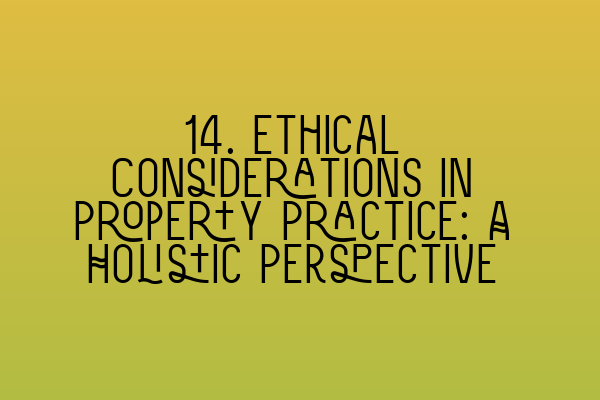14. Ethical Considerations in Property Practice: A Holistic Perspective
As property solicitors, it is crucial for us to uphold the highest ethical standards in our practice. Property transactions can have significant financial and emotional implications for our clients, and it is our responsibility to guide them through the process while ensuring their interests are protected. In this blog post, we will explore some of the ethical considerations that property practitioners must take into account and delve into a holistic perspective that encompasses both legal and moral aspects.
1. Confidentiality and Client Trust
Confidentiality is a cornerstone of the solicitor-client relationship. Our clients entrust us with sensitive information, and it is our duty to protect their interests by maintaining strict confidentiality. This means that we must not disclose any confidential information without our clients’ consent, unless required by law or professional regulations.
2. Conflict of Interest
Avoiding conflicts of interest is crucial to maintaining trust and acting in the best interests of our clients. We must carefully assess any potential conflicts and take appropriate action to address them. This includes ensuring that we do not act for multiple clients with conflicting interests without their informed consent.
3. Acting with Integrity
Integrity is an essential quality for any solicitor, and property law is no exception. We must act honestly and with integrity in all our dealings. This includes providing accurate and complete information to clients, being transparent about any potential risks or limitations, and avoiding any actions that could undermine our clients’ trust or confidence in us.
4. Professional Competence
In property practice, we must ensure that we possess the necessary legal knowledge and skills to provide competent advice to our clients. Staying updated with the latest developments in property law is crucial to providing the best possible service. This includes engaging in continuous professional development, attending relevant training courses, and seeking advice from colleagues when needed.
5. Honoring Legal Obligations
In addition to ethical considerations, property solicitors must also adhere to their legal obligations. This includes complying with all relevant legislation, regulations, and professional rules. Failing to do so can have serious consequences for both our clients and our professional reputation.
6. Duty to the Court and the Administration of Justice
As officers of the court, property solicitors have a duty to uphold the administration of justice. This means that we must act honestly, with integrity, and in accordance with the law. We must also present the court with accurate and reliable information, avoid any misleading statements, and not take any actions that could undermine the administration of justice.
7. Client Communication and Informed Consent
Effective communication with our clients is paramount in property transactions. We must ensure that clients understand their rights, obligations, and the potential risks involved. Providing clear and concise advice, explaining complex legal concepts in plain language, and obtaining informed consent are all important aspects of client communication.
8. Unconscious Bias and Equal Treatment
Property practitioners must be mindful of their own unconscious biases and strive to treat all clients fairly and equally. This includes ensuring that we do not discriminate against individuals based on their race, ethnicity, gender, religion, sexual orientation, or any other protected characteristic. Upholding the principles of equality and diversity is not only a legal requirement but also an ethical imperative.
9. Environmental Sustainability
In recent years, there has been a growing recognition of the importance of environmental sustainability in property practice. Clients are increasingly seeking advice on eco-friendly property options and sustainability initiatives. As property solicitors, we should strive to integrate environmental considerations into our advice and promote sustainable practices within the property industry.
10. Community Engagement and Pro Bono Work
Engaging with the community and participating in pro bono work are essential ways to give back as property solicitors. This can involve volunteering at legal clinics, providing free legal advice to those in need, or participating in community outreach programs. By contributing our skills and knowledge to those who cannot afford legal services, we can help promote access to justice and make a positive impact on society.
In conclusion, ethical considerations play a vital role in property practice. Upholding high ethical standards not only benefits our clients but also contributes to the overall integrity of the legal profession. As property solicitors, we must always strive to act with confidentiality, integrity, competence, and in the best interests of our clients. By embracing a holistic perspective that encompasses legal and moral aspects, we can ensure that our practice remains ethical, responsible, and client-focused.
Related Articles:
– SQE 1 Practice Exam Questions
– SQE 1 Practice Mocks FLK1 FLK2
– SQE 2 Preparation Courses
– SQE 1 Preparation Courses
– SRA SQE Exam Dates
